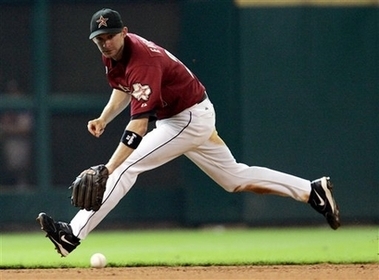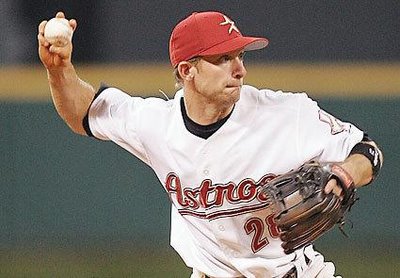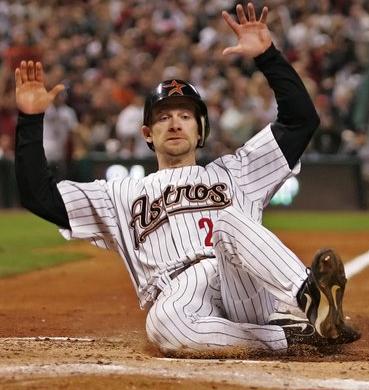

|
|
Friday, December 14, 2007
Twins Sign EverettHaving created an opening at shortstop by including Jason Bartlett in last month's trade with the Devil Rays, the Twins filled the hole yesterday by signing Adam Everett to a one-year deal worth $2.8 million plus incentives. Everett was non-tendered by the Astros following their trade for Miguel Tejada and at first glance it's tempting to lump him in with good-glove, no-hit middle infielders like Nick Punto and Juan Castro, but that's misleading because Everett is more like the good-glove, no-hit middle infielder. Numbers often disagree with the sterling defensive reputations that guys like Punto and Castro have been tagged with, but in Everett's case his reputation is strong and his numbers are even stronger. In fact, Everett's numbers--the important ones, not misleading/near-useless stats like fielding percentage and Range Factor--show him as either the best or second-best defensive shortstop in all of baseball since he became an everyday player in 2003.  Zone Rating measures the rate at which a player turns a ball hit into his defensive zone into an out, which is essentially the goal of playing defense and combines the ability to get to a ball with the ability to actually convert it into an out. For instance, if 100 balls are hit in a shortstop's zone and he converts 85 of them into an out, then his Zone Rating is .850. Here's how Everett has fared in Zone Rating on a year-to-year basis among all MLB shortstops: Zone Rating measures the rate at which a player turns a ball hit into his defensive zone into an out, which is essentially the goal of playing defense and combines the ability to get to a ball with the ability to actually convert it into an out. For instance, if 100 balls are hit in a shortstop's zone and he converts 85 of them into an out, then his Zone Rating is .850. Here's how Everett has fared in Zone Rating on a year-to-year basis among all MLB shortstops:2007 ZR 2006 ZR 2005 ZREverett's Zone Rating led all of baseball in both 2006 and 2004, finished second to 11-time Gold Glove winner Omar Vizquel in 2007, and also ranked among MLB's top five in both 2005 and 2003. No other shortstop ranked among the top five in each of the past five seasons and only Vizquel even has an argument for being as good as Everett overall. Looking at career Zone Ratings, Everett's fantastic .880 mark safely tops Vizquel's .862 and Bartlett's .854 while dwarfing Castro's .832. Revised Zone Rating is slightly different in that it looks at the rate at which a player turns a ball hit into his defensive zone into an out while ignoring plays made on balls not in a player's zone. In other words, if a shortstop jogs into foul territory to handle a pop up, that play is not included in his Revised Zone Rating (although it does get added to his "Out Of Zone" play count). The Hardball Times has Revised Zone Ratings dating back to 2004 and here's how Everett fares: 2007 RZR 2006 RZR 2005 RZRSome of the names surrounding him shift around, but Everett's place remains the same. His Revised Zone Rating led MLB in both 2006 and 2004, ranked second to Vizquel in 2007, and ranked third behind Neifi Perez and Jack Wilson in 2005. Beginning in 2004, Everett has posted yearly Revised Zone Ratings of .877, .860, .891, and .871. To put those numbers in some Twins-related context, consider that Bartlett's career RZR is .835 and Castro had an .833 RZR in Minnesota. Along with Everett's incredibly strong showing in both Zone Rating and Revised Zone Rating, David Pinto's Probabilistic Model of Range rated him as MLB's best everyday shortstop in both 2005 and 2006. Mitchel Lichtman's Ultimate Zone Rating shows Everett as not only the best defensive shortstop in baseball over the past five years, but by far the best defensive player at any position on the diamond over that span, period. Baseball Info Solutions "charted every ball hit in the majors and assigned it a percentage of difficulty based on direction, distance, speed, and the route the ball took" as part of the unique analysis found in The Fielding Bible, concluding that Everett was 119 plays better than an average shortstop between 2003-2006. In an essay featured in the same book, Bill James specifically chose Everett as the means to show how overrated Derek Jeter is defensively. Even the most advanced defensive metrics often disagree on the best defenders at each position and the nature of defensive stats leads to quite a bit of year-to-year variation, but in Everett's case there's near-complete agreement across the board and plenty of yearly consistency. He's simply an absolutely phenomenal defensive shortstop and, while he's been snubbed by the often clueless Gold Glove voters, has a legitimate argument for being one of the elite defensive players of this era.  Of course, like many of the truly great defensive players in baseball history Everett is also a horrible hitter. Despite calling a hitter-friendly ballpark home, playing in a weaker league, and getting 10 percent of his career walks thanks to batting in front of the pitcher, Everett has hit just .248/.299/.357 in 2,374 plate appearances. That still makes him a much better hitter than Castro (.231/.269/.336), but Everett is essentially equal to Punto (.248/.314/.321) offensively. Of course, like many of the truly great defensive players in baseball history Everett is also a horrible hitter. Despite calling a hitter-friendly ballpark home, playing in a weaker league, and getting 10 percent of his career walks thanks to batting in front of the pitcher, Everett has hit just .248/.299/.357 in 2,374 plate appearances. That still makes him a much better hitter than Castro (.231/.269/.336), but Everett is essentially equal to Punto (.248/.314/.321) offensively.The question is whether Everett's second-to-none defense at shortstop can make up for his awful hitting. During his career Everett has essentially been the definition of a replacement-level shortstop offensively, producing a combined Value Over Replacement Player of 2.4 in 2,374 trips to the plate. Broken down to every 600 plate appearances (approximately one full season's worth of playing time), Everett has been about 0.6 runs better than a replacement-level shortstop offensively. Jeter led all AL shortstops in VORP this season with 53.3, followed by Carlos Guillen (45.0), Michael Young (38.1), Miguel Tejada (31.8), and Orlando Cabrera (31.7) rounding out the top five. Bartlett was ninth in the league at 14.7. In other words, Everett figures to be about 30 runs worse than a good-hitting shortstop and about 15 runs worse than a decent-hitting shortstop. Baseball Prospectus agrees with that assessment, showing Everett as 18.7 runs below average per 600 plate appearances. Given that, for Everett to be an "average" all-around shortstop he has to be 15-20 runs above average with his glove. That may seem like a huge amount of runs at first glance, but Everett's defensive numbers suggest that it's well within reach. According to Zone Rating and Revised Zone Rating, he's been approximately 25 runs above average defensively per full season. Ultimate Zone Rating shows him as about 30 runs better than average per season. If Everett simply hits his usual .250/.300/.350 at the plate and provides his usual outstanding defense in the field, he'll be a slightly above average all-around shortstop who's a much better choice than in-house options Punto and Brendan Harris. Another viable option would have been signing free agent David Eckstein, but he's really just a better-hitting, worse-fielding version of "slightly above average all-around shortstop" and received $4.5 million from the Blue Jays earlier this week.  Hitting is much easier to simplistically evaluate than defense, so on the surface the fact that both Harris and Eckstein are 15-20 runs better than Everett offensively makes it seem like they're clearly better all-around players despite being sub par defenders. And most of the time that'd be correct, because as the Twins learned the hard way with Castro, the problem with many good-glove, no-hit middle infielders is that their defense isn't exceptional enough to make up for their putrid offense. Hitting is much easier to simplistically evaluate than defense, so on the surface the fact that both Harris and Eckstein are 15-20 runs better than Everett offensively makes it seem like they're clearly better all-around players despite being sub par defenders. And most of the time that'd be correct, because as the Twins learned the hard way with Castro, the problem with many good-glove, no-hit middle infielders is that their defense isn't exceptional enough to make up for their putrid offense.However, if there's one player in all of baseball whose glove can balance out the damage done by a .650 OPS it's Everett. He's basically the player that the Twins misguidedly thought they had in Castro, providing replacement-level offense and legitimately phenomenal defense (as opposed to Castro's sub-replacement level offense and illegitimately phenomenal defense). Everett might be 15-20 runs worse than Harris and Eckstein offensively, but he makes up for that and then some defensively. Everett turns 31 years old in February and missed most of 2007 with a fractured fibula suffered while ranging into left field chasing a fly ball, so there's a chance that his days of providing dominant defense are in the rear-view mirror. However, he was fantastic prior to suffering the injury and even a slight drop-off in his glovework would leave the Twins with a valuable player at a reasonable cost. Their value comes in different packages, but the Twins have more or less replaced Bartlett with an equal player. Once you're done here, check out my latest "Daily Dose" column over at Rotoworld.     
|
E-Mail: aarongleeman@gmail.com Twitter: twitter.com/aarongleeman Read Me Elsewhere Rotoworld NBC Sports MinnPost Minnesota Twins Stuff Minneapolis Star Tribune St. Paul Pioneer Press MinnesotaTwins.com LaVelle E. Neal III Joe Christensen Kelsie Smith Kelly Thesier Seth Stohs Stick and Ball Guy Nick Nelson Parker Hageman Phil Mackey John Bonnes Edward Thoma Josh Johnson Howard Sinker Twinkie Town Pat Neshek Sports Stuff Hardball Talk Rotoworld Fan Graphs Baseball-Reference.com The Hardball Times Baseball America Baseball Think Factory Bill Simmons Rob Neyer Joe Posnanski Big League Stew The Big Lead Deadspin Fanhouse Baseball Prospectus U.S.S. Mariner Al's Ramblings Sports By Brooks Baseball Musings MLB Trade Rumors Non-Sports Stuff MinnPost Alan Sepinwall David Brauer Adam Carolla Poker Road Gorilla Mask Wicked Chops Poker WWTDD? Popoholic The Superficial Steve Silver Tao of Poker Discount Sporting Goods  Official Fantasy Girl of AG.com OFGoAG.com Timeline: Heidi Klum (8/2002 - 12/2003) Jessica Alba (12/2003 - 10/2004) Elisha Cuthbert (10/2004 - 11/2006) Vacant (11/2006 - 6/2008) Keeley Hazell (6/2008 - 3/2010) Mila Kunis (3/2010 - Present) OFGoAG.com Candidates: Marisa Miller Jenna Fischer Kate Beckinsale Keeley Hazell Diora Baird Top 40 Twins Prospects of 2010: 1. Aaron Hicks, CF 2. Kyle Gibson, SP 3. Wilson Ramos, C 4. Miguel Angel Sano, SS 5. Ben Revere, CF 6. Angel Morales, CF 7. David Bromberg, SP 8. Danny Valencia, 3B 9. Matthew Bashore, SP 10. Billy Bullock, RP 11. Rene Tosoni, RF 12. Chris Parmelee, RF 13. Adrian Salcedo, SP 14. Joe Benson, CF 15. Jeff Manship, SP 16. Tyler Robertson, SP 17. Carlos Gutierrez, RP 18. B.J. Hermsen, SP 19. Anthony Slama, RP 20. Max Kepler, CF 21. Alex Burnett, RP 22. Robert Delaney, RP 23. Luke Hughes, 3B 24. Ben Tootle, RP 25. Deolis Guerra, SP 26. Shooter Hunt, SP 27. Trevor Plouffe, SS 28. Michael McCardell, SP 29. Reggie Williams, 2B 30. Estarlin De Los Santos, SS 31. Derek McCallum, 2B 32. Jose Morales, C 33. Chris Herrmann, LF 34. Bobby Lanigan, SP 35. Danny Rams, C 36. Josmil Pinto, C 37. Steven Tolleson, 2B 38. Anderson Hidalgo, 3B 39. Loek Van Mil, RP 40. Joe Testa, RP |